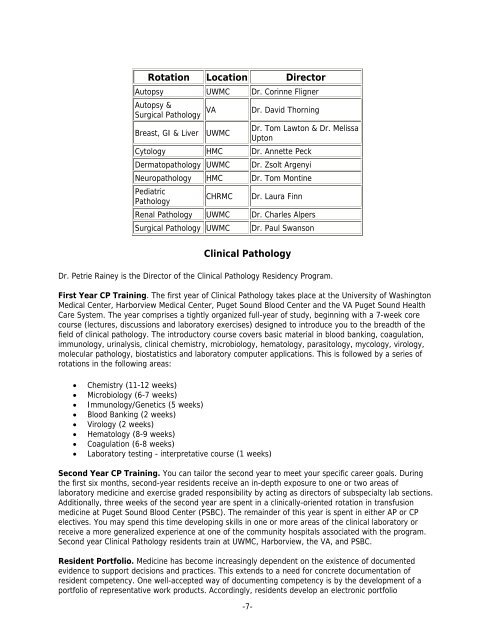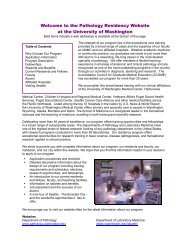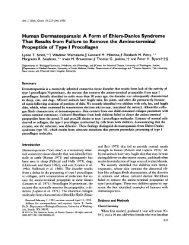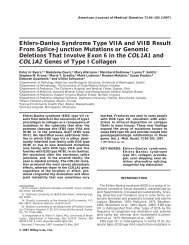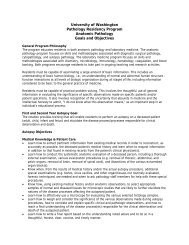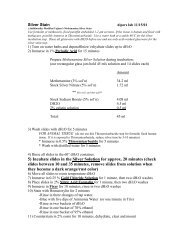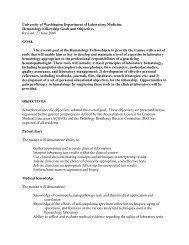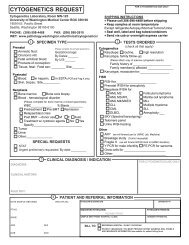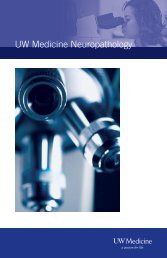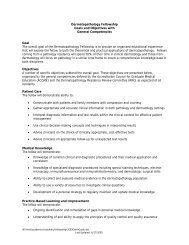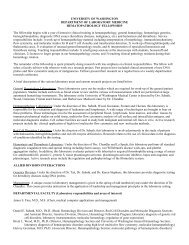Pathology Residency Program - Pathology - University of Washington
Pathology Residency Program - Pathology - University of Washington
Pathology Residency Program - Pathology - University of Washington
Create successful ePaper yourself
Turn your PDF publications into a flip-book with our unique Google optimized e-Paper software.
Rotation Location Director<br />
Autopsy UWMC Dr. Corinne Fligner<br />
Autopsy &<br />
Surgical <strong>Pathology</strong> VA<br />
-7-<br />
Dr. David Thorning<br />
Dr. Tom Lawton & Dr. Melissa<br />
Breast, GI & Liver UWMC<br />
Upton<br />
Cytology HMC Dr. Annette Peck<br />
Dermatopathology UWMC Dr. Zsolt Argenyi<br />
Neuropathology HMC Dr. Tom Montine<br />
Pediatric<br />
<strong>Pathology</strong><br />
CHRMC Dr. Laura Finn<br />
Renal <strong>Pathology</strong> UWMC Dr. Charles Alpers<br />
Surgical <strong>Pathology</strong> UWMC Dr. Paul Swanson<br />
Clinical <strong>Pathology</strong><br />
Dr. Petrie Rainey is the Director <strong>of</strong> the Clinical <strong>Pathology</strong> <strong>Residency</strong> <strong>Program</strong>.<br />
First Year CP Training. The first year <strong>of</strong> Clinical <strong>Pathology</strong> takes place at the <strong>University</strong> <strong>of</strong> <strong>Washington</strong><br />
Medical Center, Harborview Medical Center, Puget Sound Blood Center and the VA Puget Sound Health<br />
Care System. The year comprises a tightly organized full-year <strong>of</strong> study, beginning with a 7-week core<br />
course (lectures, discussions and laboratory exercises) designed to introduce you to the breadth <strong>of</strong> the<br />
field <strong>of</strong> clinical pathology. The introductory course covers basic material in blood banking, coagulation,<br />
immunology, urinalysis, clinical chemistry, microbiology, hematology, parasitology, mycology, virology,<br />
molecular pathology, biostatistics and laboratory computer applications. This is followed by a series <strong>of</strong><br />
rotations in the following areas:<br />
• Chemistry (11-12 weeks)<br />
• Microbiology (6-7 weeks)<br />
• Immunology/Genetics (5 weeks)<br />
• Blood Banking (2 weeks)<br />
• Virology (2 weeks)<br />
• Hematology (8-9 weeks)<br />
• Coagulation (6-8 weeks)<br />
• Laboratory testing - interpretative course (1 weeks)<br />
Second Year CP Training. You can tailor the second year to meet your specific career goals. During<br />
the first six months, second-year residents receive an in-depth exposure to one or two areas <strong>of</strong><br />
laboratory medicine and exercise graded responsibility by acting as directors <strong>of</strong> subspecialty lab sections.<br />
Additionally, three weeks <strong>of</strong> the second year are spent in a clinically-oriented rotation in transfusion<br />
medicine at Puget Sound Blood Center (PSBC). The remainder <strong>of</strong> this year is spent in either AP or CP<br />
electives. You may spend this time developing skills in one or more areas <strong>of</strong> the clinical laboratory or<br />
receive a more generalized experience at one <strong>of</strong> the community hospitals associated with the program.<br />
Second year Clinical <strong>Pathology</strong> residents train at UWMC, Harborview, the VA, and PSBC.<br />
Resident Portfolio. Medicine has become increasingly dependent on the existence <strong>of</strong> documented<br />
evidence to support decisions and practices. This extends to a need for concrete documentation <strong>of</strong><br />
resident competency. One well-accepted way <strong>of</strong> documenting competency is by the development <strong>of</strong> a<br />
portfolio <strong>of</strong> representative work products. Accordingly, residents develop an electronic portfolio


